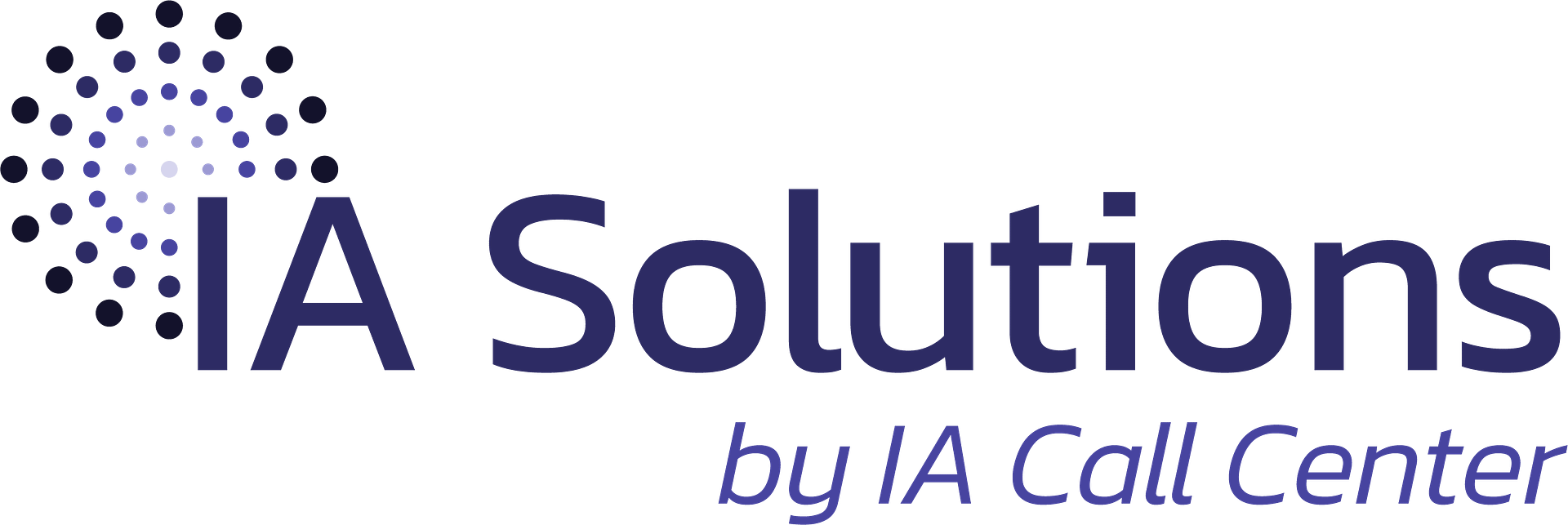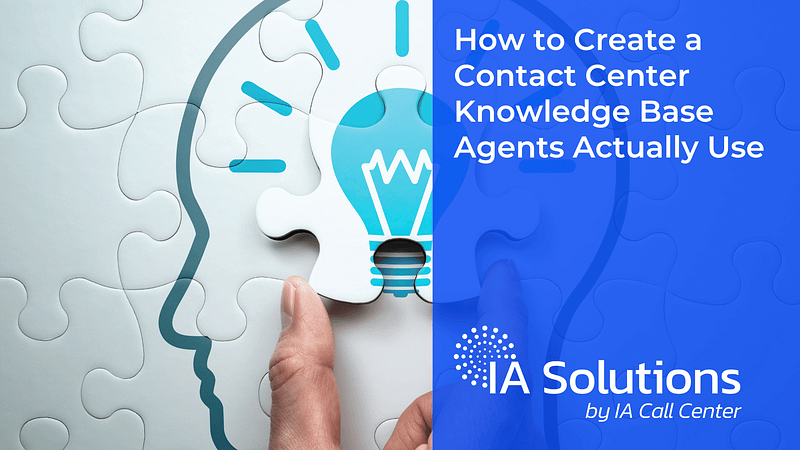How to Create a Contact Center Knowledge Base Agents Actually Use
Rather listen to the BlogCast for this post instead? Click the red YouTube play button below to hear it now.
Introduction to Contact Center Knowledge Bases
In today’s fast-paced customer service world, having a solid contact center knowledge base is more important than ever. Think of it as the backbone of your support operations, where agents quickly find answers to customer questions, streamlining their workflow and boosting efficiency. Without an effective knowledge base, agents might waste valuable time searching for information or, worse, provide inconsistent responses that can frustrate customers. Investing in a well-structured knowledge base not only enhances agent performance but also elevates the overall customer experience.
But a successful contact center knowledge base is more than just a digital library. It needs to be user-friendly, regularly updated, and tailored to meet the specific needs of both your agents and customers. By focusing on these elements, businesses can ensure their knowledge base becomes an indispensable tool that agents rely on every day. This article explores the essential components of creating a knowledge base that agents actually use, ensuring your contact center runs smoothly and delivers exceptional customer service.
What is a Contact Center Knowledge Base?
A contact center knowledge base is a comprehensive repository of information, resources, and guidelines designed to help customer service agents address and resolve customer issues efficiently. It typically includes FAQs, troubleshooting steps, product or service details, standard operating procedures (SOPs), and other relevant documentation. The primary goal? To provide agents with quick and easy access to accurate information, enabling them to handle customer inquiries effectively.
But it’s not just a reference tool. A well-designed contact center knowledge base fosters consistency in customer interactions. When all agents have access to the same information, it ensures a uniform standard of service quality across the board. Plus, an effective knowledge base supports ongoing training and onboarding processes, helping new agents become proficient faster. In the end, a robust knowledge base boosts both agent performance and customer satisfaction, making it a critical component of any successful contact center strategy.
Common Reasons Agents Ignore a Knowledge Base
Despite the obvious benefits, agents sometimes overlook or underutilize a contact center knowledge base. One common reason is simply not knowing it exists or how to use it effectively. If agents aren’t properly trained or if the knowledge base isn’t seamlessly integrated into their daily workflows, it can easily become neglected. Imagine an agent who’s just started their first day without a proper introduction to the knowledge base. Without knowing where to look, they might spend valuable time asking colleagues for help instead of finding answers themselves.
Another significant factor is the perceived usefulness of the content. If the knowledge base contains outdated, irrelevant, or hard-to-navigate information, agents may find it more efficient to seek answers from their coworkers instead. Trusting peers over a cumbersome knowledge base can lead to inconsistencies in the information provided to customers. Additionally, a confusing layout or poor structure can make it difficult for agents to locate the information they need quickly, resulting in frustration and reduced utilization of the knowledge base.

Understanding Agent Needs for an Effective Knowledge Base
Creating a contact center knowledge base that agents actually use requires a deep understanding of their specific needs and workflows. Conducting surveys, interviews, and observing agent interactions can provide valuable insights into the types of information they frequently seek and the challenges they face when accessing resources. By identifying these needs, businesses can tailor the knowledge base to address the most relevant and pressing issues, ensuring that it becomes an indispensable tool for agents.
Moreover, involving agents in the development and maintenance of the knowledge base fosters a sense of ownership and increases its relevance. Agents who contribute to the knowledge base are more likely to trust its content and rely on it for their daily tasks. Additionally, regularly updating the knowledge base based on agent feedback ensures that the information remains current and useful. By prioritizing agent needs, businesses can create a contact center knowledge base that truly supports their team and enhances overall performance.
Designing an Intuitive Contact Center Knowledge Base
An intuitive design is paramount for a contact center knowledge base to be effective. The layout should be clean, organized, and easy to navigate, allowing agents to find the information they need quickly, without unnecessary frustration. Implementing a well-structured taxonomy, clear categorization, and a robust search functionality can significantly enhance the user experience. Visual elements such as icons, color coding, and consistent formatting can further aid in making the knowledge base user-friendly.
Besides visual design, the user interface should prioritize accessibility and responsiveness. Agents should be able to access the knowledge base seamlessly across different devices, whether they are using a desktop computer, tablet, or smartphone. Mobile-friendly designs ensure agents can retrieve information on the go, which is especially important for those who work remotely or in dynamic environments. By focusing on both aesthetics and functionality, businesses can create a contact center knowledge base that is not only visually appealing but also highly practical and efficient for daily use.
Best Practices for Building a Contact Center Knowledge Base
Building an effective contact center knowledge base involves adhering to several best practices that ensure the content is valuable, accurate, and easy to use. First and foremost, the information should be clear, concise, and well-organized. Avoiding jargon and using straightforward language helps agents understand and apply the content quickly. Additionally, categorizing information logically and providing a comprehensive search function can enhance the ease of finding relevant articles.
Regular maintenance and updates are also critical for maintaining the integrity of the knowledge base. Establishing a schedule for reviewing and updating content ensures that the information remains current and accurate. Incorporating feedback mechanisms allows agents to suggest improvements or report outdated information, facilitating continuous enhancement of the knowledge base. Furthermore, integrating analytics to monitor usage patterns and identify gaps in the content can help businesses proactively address any issues, ensuring that the knowledge base remains a valuable resource for agents.

Incorporating Standard Operating Procedures (SOP)
Integrating Standard Operating Procedures (SOPs) into your contact center knowledge base is essential for maintaining consistency and quality in customer interactions. SOPs provide detailed instructions on how to handle various scenarios, ensuring that all agents follow the same protocols and deliver uniform service. By including SOPs in the knowledge base, businesses can minimize errors and enhance the reliability of their support operations.
Moreover, SOPs serve as a valuable training tool for new agents, helping them understand the established processes and expectations from the outset. Clear and accessible SOPs can reduce the learning curve for new hires, allowing them to become productive more quickly. Additionally, having SOPs readily available in the knowledge base encourages continuous adherence to best practices, promoting a culture of excellence within the contact center. Incorporating SOPs ensures that your contact center knowledge base supports both operational efficiency and high standards of customer service.
Addressing Common Customer Inquiries in Your Knowledge Base
A comprehensive contact center knowledge base should address the most frequent customer inquiries your agents encounter. By identifying and cataloging these common questions, you can create targeted articles that provide clear and concise answers. This not only speeds up the resolution process, but also ensures that customers receive consistent and accurate information every time they reach out for support.
Including detailed troubleshooting guides and step-by-step instructions can empower agents to handle inquiries more effectively. For example, if customers often ask about resetting their passwords, having a dedicated section with simple instructions can reduce the time agents spend explaining the process. Additionally, regularly updating these sections based on emerging trends or new product features ensures that your knowledge base remains relevant and useful. By focusing on the most common customer inquiries, you can enhance both agent efficiency and customer satisfaction.
Including Comprehensive Product and Service Details
A contact center knowledge base should provide in-depth information about your products and services. This includes specifications, features, benefits, and common issues related to each product or service offering. By equipping agents with detailed knowledge, they can better assist customers, provide accurate information, and upsell or cross-sell additional products and services when appropriate.
Including comparative information and use-case scenarios can help agents understand how different products or services meet varying customer needs. For instance, if you offer multiple software solutions, detailing the differences and ideal use cases for each can enable agents to recommend the best fit for a customer’s specific situation. Comprehensive product and service details not only enhance the agent’s ability to assist, but also contribute to building trust and credibility with customers.

Integrating Contact Center Software Topics
Incorporating sections on contact center software topics within your contact center knowledge base can significantly streamline agent workflows and improve overall efficiency. Providing guides on how to use specific CRM systems, communication tools, and other software applications ensures agents are well-versed in the technologies they use daily. This reduces the learning curve and minimizes downtime caused by technical issues or misunderstandings.
For example, detailed instructions on navigating a CRM platform can help agents quickly find customer information, log interactions, and update records without unnecessary delays. Similarly, tips on utilizing chat systems or managing call queues can enhance an agent’s ability to handle multiple tasks efficiently. By integrating comprehensive software-related content, your knowledge base becomes a valuable resource that supports agents in leveraging technology to deliver superior customer service.
Keeping the Knowledge Base Up-to-Date and Accurate
Keeping your contact center knowledge base up-to-date and accurate is non-negotiable for maintaining its effectiveness. Outdated information can mislead agents and customers, causing frustration and eroding trust. According to Bloomfire, businesses that regularly update their knowledge bases see a 20% increase in agent productivity. Establishing a routine for reviewing and refreshing content ensures that all information reflects the latest developments in your products, services, and policies.
Moreover, leveraging real-time update capabilities allows your knowledge base to adapt swiftly to changes, such as new product features or policy adjustments. Implementing version control and tracking modifications can help maintain the integrity of the knowledge base, enabling you to revert to previous versions if necessary. By prioritizing accuracy and timeliness, your contact center knowledge base remains a reliable resource that agents can depend on, ultimately enhancing both agent performance and customer satisfaction.

Using the Knowledge Base for Onboarding and Ongoing Training
A contact center knowledge base plays a pivotal role in both onboarding new agents and providing ongoing training for existing staff. For new hires, the knowledge base serves as a foundational resource, offering comprehensive information about the company’s products, services, and operational procedures. This facilitates a smoother and faster onboarding process, enabling new agents to become proficient more quickly and contribute effectively to the team.
For existing agents, the knowledge base supports continuous learning and development by providing access to the latest information and best practices. Regular updates and new content can address emerging trends, new product features, or changes in customer expectations, ensuring that agents remain well-informed and capable of delivering top-notch service. Additionally, incorporating multimedia elements such as video tutorials and interactive guides can enhance the training experience, making it more engaging and effective. By leveraging the knowledge base for both onboarding and ongoing training, businesses can foster a culture of continuous improvement and excellence within their contact centers.
Monitoring, Tracking, and Soliciting Feedback on Your Knowledge Base
To maximize the effectiveness of a contact center knowledge base, implementing robust monitoring and tracking mechanisms is essential. Using analytics tools can provide insights into how often specific articles are accessed, which topics are most frequently searched, and where agents may be encountering difficulties. This data helps identify trends, measure the knowledge base’s impact on agent performance, and highlight areas that require additional attention or improvement. For instance, according to Zendesk, companies with a well-utilized knowledge base see significantly faster issue resolutions.
Equally important is the process of soliciting feedback from agents. Encouraging agents to share their experiences, suggestions, and concerns about the knowledge base fosters a collaborative environment and ensures that the resource evolves to meet their needs. Feedback can be gathered through surveys, focus groups, or direct communication channels, allowing businesses to make informed decisions about content updates and structural changes. By actively monitoring usage and incorporating agent feedback, businesses can continuously refine their contact center knowledge base, ensuring it remains a valuable and user-centric tool.

Optimizing Your Knowledge Base for SEO
Optimizing your contact center knowledge base for search engines can significantly enhance its visibility and accessibility, both internally and externally. By implementing SEO best practices, such as using relevant keywords, crafting clear and descriptive titles, and structuring content with proper headings, businesses can improve the process of searching their knowledge base articles. This ensures that agents can quickly locate the information they need, reducing response times and increasing efficiency.
Furthermore, an SEO-optimized knowledge base can also serve as a valuable public resource, attracting potential customers and enhancing the company’s online presence. By making high-quality, informative content available to the public, businesses can establish themselves as industry leaders and build trust with their audience. Incorporating metadata, optimizing images, and ensuring mobile-friendliness are additional strategies that can boost the effectiveness of the knowledge base. By prioritizing SEO, businesses can create a contact center knowledge base that not only supports internal operations but also contributes to broader marketing and customer engagement efforts.
Conclusion: Enhancing Customer Support with an Effective Knowledge Base
An effective contact center knowledge base is a cornerstone of exceptional customer service, providing agents with the tools and information they need to resolve inquiries swiftly and accurately. By understanding agent needs, designing an intuitive interface, maintaining up-to-date content, and continuously monitoring and improving the knowledge base, businesses can create a resource that significantly enhances operational efficiency and customer satisfaction. Investing in a robust knowledge base not only supports agents in their daily tasks but also contributes to the overall success and reputation of the business.
Choosing a Professional Contact Center and Partnering with IA Solutions
Selecting a professional contact center that effectively utilizes a contact center knowledge base is crucial for achieving superior customer service outcomes. A well-managed knowledge base ensures that agents have access to accurate and timely information, enabling them to resolve issues efficiently and provide consistent support. When choosing a contact center partner, it’s important to evaluate their approach to knowledge management, their commitment to maintaining up-to-date content, and their ability to tailor the knowledge base to meet specific business needs.
Partnering with IA Solutions, a boutique contact center with over 53 years of industry experience, can elevate your customer support capabilities. IA Solutions specializes in creating and managing robust knowledge bases that empower agents and enhance customer satisfaction. Their expertise ensures that your knowledge base is not only comprehensive and accurate but also user-friendly and aligned with your business objectives. By leveraging IA Solutions’ professional contact center services, businesses of all sizes can achieve greater efficiency, improve customer experiences, and drive long-term success.
For businesses seeking to optimize their contact center operations, partnering with a professional contact center like IA Solutions can provide the expertise and support needed to maximize the potential of their knowledge base. With over 53 years of experience, IA Solutions is dedicated to delivering tailored solutions that drive excellence in customer service. Contact IA Solutions today at 1-888-631-9711 or via email at [email protected] to discover how a contact center with a well-crafted knowledge base can transform your customer support and propel your business towards greater success.












